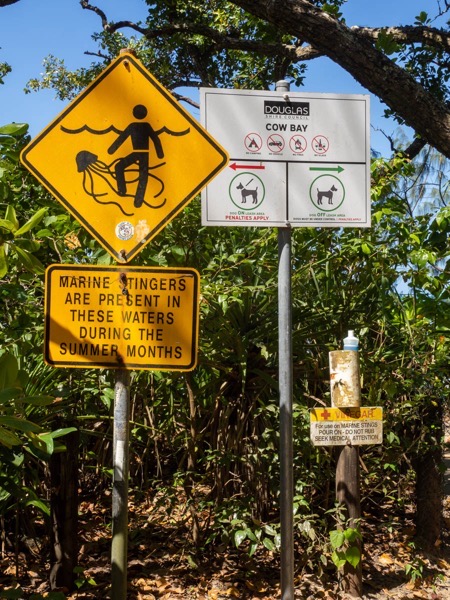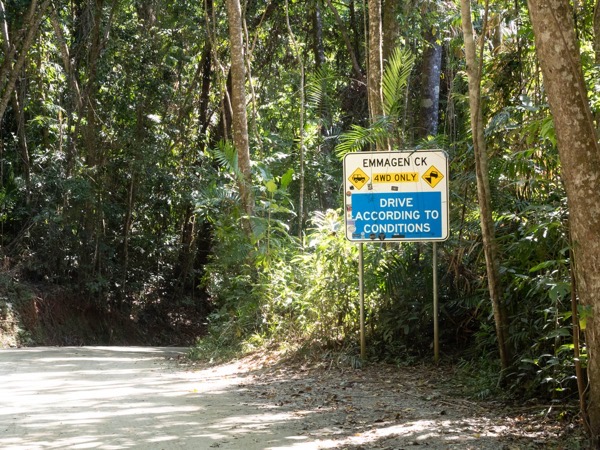
We said goodbye to Port Douglas yesterday moring after having a quick look at two of its historic sights.
One was ‘St Mary’s by the Sea’ Church. Built in 1880 on the hill in Port Douglas, this historic church was relocated to the current site in 1988. The Church was fully-restored over a long and difficult twelve month period. An official re-opening ceremony was held on November 11, 1989. St Mary’s By The Sea is now a non-denominational chapel and one of the most picturesque churches in Australia.

The old sugar wharf at Port Douglas was built in 1905 by the Douglas Shire Council to load sugar for export to southern markets. It remained in operation until the 1950s and has, since that time, had a variety of uses. It seems to now be mostly used as a wedding venue.

The sugar town of Mossman is a major service town in this area of FNQ (Far North Queensland). Every old town has a large pub that once used to provide accommodation, food and drink for weary travellers. Mossman is no exception, other than for the cane railway that runs right down the main street. The sweet smell of sugar and molasses from the mill at the end of the street permeates the whole town.

Leaving Mossman, we found an amazing grove of Raintrees that were all covered in ferns They are recognised by the National Trust and originally from Jamaica. They make a significant contribution to the landscape of this historic town. They are interesting looking trees and the epiphytic ferns which cover their trunks and branches give the trees an old, woolly appearance.

We detoured to the tiny town of Daintree to see what wonders it might contain. It only has about five streets but we found the view across the broad Daintree River very scenic. The extensive rainforest in this region is named after the Daintree River, which in turn was named in honour of Australian geologist and photographer Richard Daintree. It is a remnant of what was once a vast forest that covered the entire Australian continent.

We crossed the river on the ferry after paying $47 for a return trip. There is no bridge and the ferry provides the only form of river crossing. We drove another 48 kilometres through the rainforest on a windy and sometimes narrow road to the village of Cape Tribulation.

The Alexandra Lookout, just north of the ferry crossing gave us a good view of the mouth of the Daintree River.

Eventually, we reached our accommodation at Cape Tribulation. ‘Cape Trib’, as it is called locally, has many resorts and camp grounds but doesn’t have any services – no petrol, no TV, no pharmacy or doctor, no newspapers, just a 4G phone tower. There are a couple of cafes (one of which has a small convenience store) but there is only one shop in town – The Friendly Grocer.It carries a basic range of goods – excellent if you have simple tastes.

Our cabin at the resort turned out to be very difficult for Jill as it was a long walk from the carpark and the path to the Restaurant was bumpy and difficult for her. Fortunately, we were able to transfer to a better located room for our second night.

We have spent the last day and half exploring some very scenic locations north and south along the coast. There are some very fine beaches but they alll have brilliant (non- swimmable) azure water, golden sand and the rainforest as a backdrop. Being blasé, I have begun to call them JAB beaches (Just another beach). All of them have a bottle of vinegar to treat stinger bites and bold warning signs about their danger.


We slept in on our second day and headed down the road to Masons Cafe for brunch. They have a beautiful waterhole in the creek that runs through their property and for a payment of $1, you can take advantage of the crocodile free water. The sign at the cafe says “There are no crocodiles in our water hole – they are all in our burgers!”

I’m finding that the creeks around here are as attractive as the beaches. We did a walk along the one-kilometre Madja boardwalk today. It was flat and even and ideal for Jill on her mobility scooter. It generally wound through a swampy area along a creek with the information boards teaching us a lot about tropical mangrove environments. For example, we found out that there are 42 different species of mangrove tree here. Many of the plants above, below and beside us were quite dramatic.




This is the northernmost point of our trip (almost). About six kilometres further north is Emmagen Creek. It ihas a waterhole, again making a very pretty location. It’s the point where the standard road ends. You need a 4WD to cross the creek and continue further to the Cape. We could go no further, so we retreated back to town after taking a few photos. Tomorrow, we start our long journey back home.





Wonderful descriptions Bruce. We didn’t get up there this year, but you’ve certainly reminded us how beautiful it is. Must get up there next year.
Thanks Bruce, am so enjoying your travels up north. Wonderful photos and descriptions. Glad you can enjoy it on your mobility scooter Jill. Take care!!
We are so fortunate to have such beauty in our country and to have your wondrous photography to remind us that it is there, Bruce.